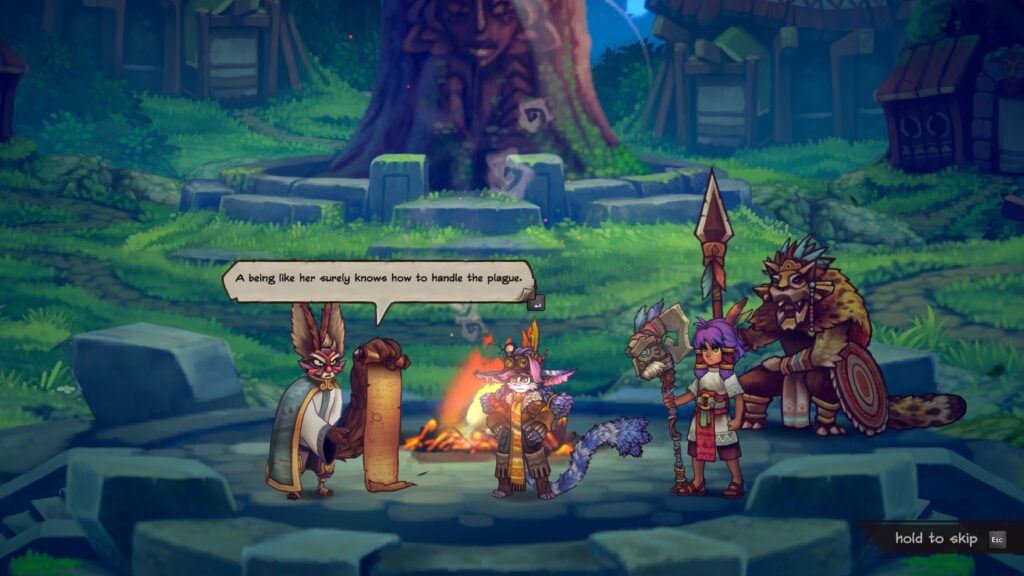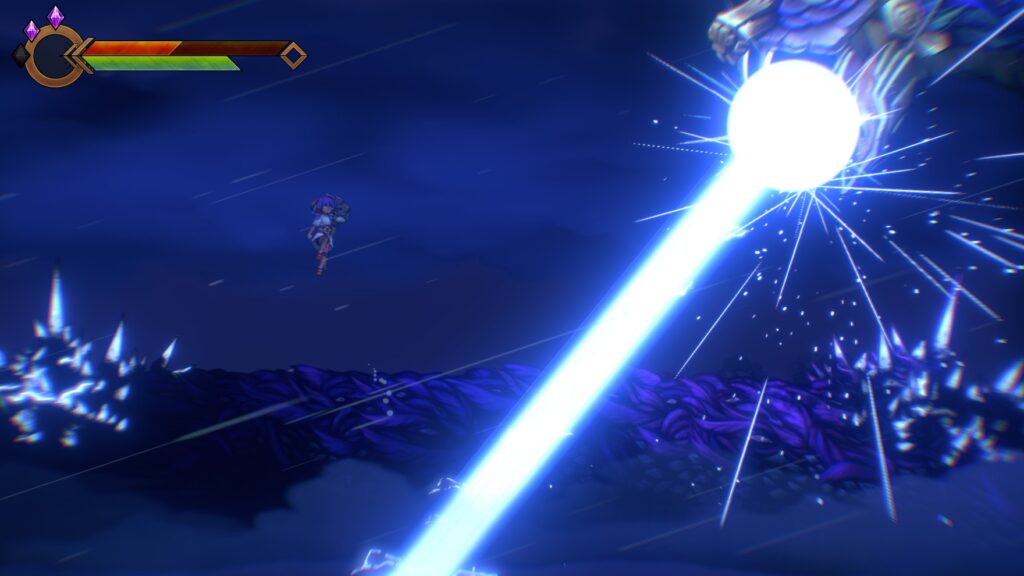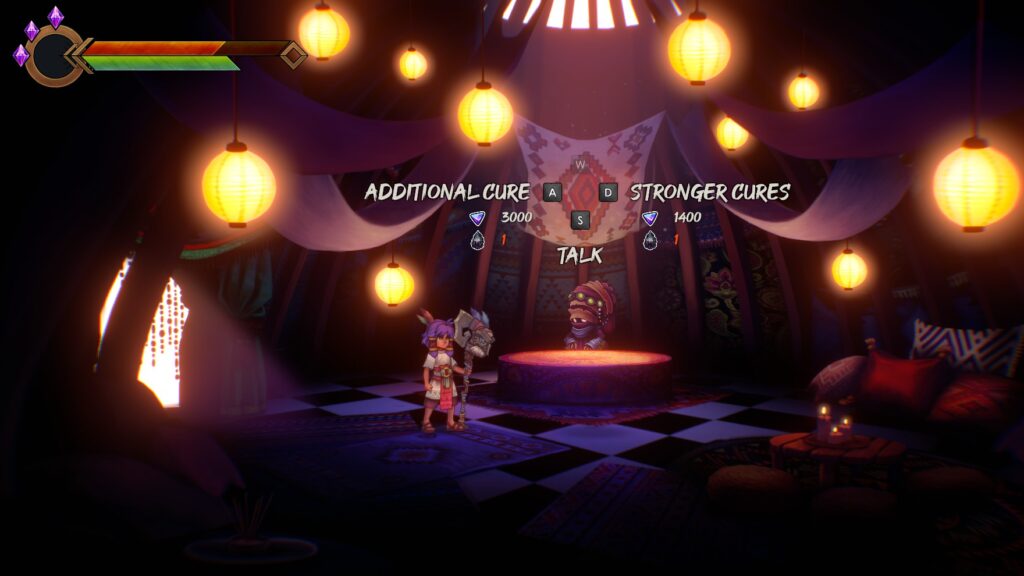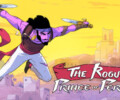
Developer: Grimbart Tales
Publisher: Assemble Entertainment
Platform: PC, PS4, Xbox one
Tested on: PC
ITORAH – Review
Metroidvania games are generally famous for their interconnected worlds where players unlock shortcuts between areas. While they often feature backtracking, this is usually in favor of revisiting previously inaccessible areas with new abilities. When this gimmick is removed, the backtracking is ultimately left as a purposeless time waster. ITORAH is a recently released game which runs into this issue, forcing its players to constantly go through old areas without a payout.
Story
In ITORAH, players will control the titular protagonist (without all caps) in a quest to stop the mysterious corruption spreading throughout the world. The game’s plot is standard good vs evil fluff without much depth to it. None of the characters that the players will encounter are particularly profound either, Itorah herself being no exception. It also doesn’t help that the story ultimately has a predictable cliché ending. It is rather clear that an interesting narrative wasn’t the game’s focus, being relegated to an excuse to get things going.
Graphics
As one of the game’s strongest points, ITORAH’s graphics consist of detailed hand-drawn illustrations carefully animated to create gorgeous views. Each of the different areas is unique in its own right, ranging from volcanic forges to ancient libraries. This also applies to the character designs, although most of these don’t seem to have a common theme, somewhat reducing the game’s overall cohesion.
Sound
Alongside its graphics, ITORAH’s sound design is one of its highlights, featuring a great soundtrack with over 40 songs. Other than that, the SFX are serviceable, with a few particularly good ones for ambient sound. The game doesn’t feature voiceovers either, opting instead for nonsense-speak akin to titles like Animal Crossing.
Gameplay
Although classified as a Metroidvania, ITORAH is better described as a platformer with light combat mechanics. This is due to how little the game seems to care about its combat, despite riddling the world with enemies, occasional arenas, and some bosses. Throughout the experience, players will never improve their basic combo or combat abilities. While some of the skills obtained while progressing can be utilized in combat, their optimization for this is rather lacking, limited by a stamina system and other issues.
A good example of these limitations would be the charged attack, which is immediately canceled upon taking damage or by any fall. Similarly, the throw attack obtained later in the game can only be used in very specific situations, due to how it disarms Itorah for its duration. The only move which may be effectively employed in combat is the ground pound, although it is still held down by its stamina consumption, which Itorah’s dodge also utilizes. All of these issues ultimately combine to make combat a rather uninspired affair, where players will alternate between the basic combo, pounding and dodging over and over.
Alongside these abilities, Itorah is also capable of healing by consuming charges which restore at checkpoints. While players will begin the game with a single charge, it is possible to increase their amount and effectiveness by obtaining “Petrified Echoes”. Similarly, Itorah’s health and stamina can also be increased, requiring a different special item. These items can be found throughout the world, stored in chests outside of the beaten path, although not particularly hidden. Upon finding them, and by paying some currency obtained from killing enemies, players will be able to interact with two NPCs in town who’ll deliver these upgrades.
Other than for upgrades, the aforementioned currency doesn’t have much use. What this entails is yet another nail in the combat’s coffin, making enemies in the world easy to ignore. Other than the few sections with forced gauntlets and the handful of bosses, players have no incentive to kill any other enemies. With a minimum amount of exploration and by simply playing the game, it is easy enough to rack up enough money to afford most upgrades, especially so since enemies respawn after checkpoints.
Besides its combat, ITORAH doesn’t have much to highlight. The platforming featured in the game is serviceable but not particularly remarkable, and the same can be said about its puzzles. Part of this is largely due to the linear structure of the game, where players will always obtain the new ability required for progression at the beginning of each area. Never will they find themselves stumped or in a particular need to explore in order to progress.
Conclusion
ITORAH is a very formulaic game with little to no bite. Players with previous Metroidvania or platformer experience won’t find anything new in it. Despite this, the game is generally alright, possibly serving as a decent introduction to either genre. Sold for $/€14,99/£13.11, it is recommendable to wait for a sale before picking up the game, as it offers less than 8 hours of content.
Personal Opinion
“Honestly, ITORAH was an incredibly bland experience for me. While I don’t think the game is particularly bad, it seems to be afraid of posing any amount of challenge. This is not a bad thing in most cases, but the game still wouldn’t hurt from making puzzles harder than hitting a lever several times. What it definitely wouldn’t hurt from is a much-needed improvement to its combat, either by removing unnecessary enemies or providing more tools or rewards to make these encounters worth something. At a certain point in the game, I started ignoring every single enemy in my path, being completely fed up with them and the constant backtracking, which didn’t hinder me in any way. By the end of the game, I still had almost every upgrade (not all, since I missed a few of the required items), not hurting for money at any point in the adventure.”
ITORAH - Review,








No Comments